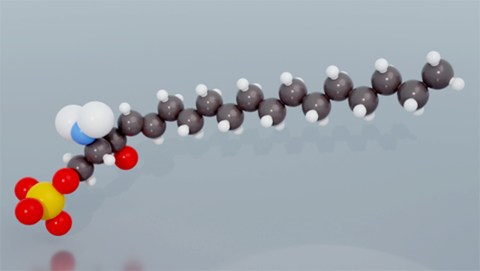The research group is located in the Center for Molecular Biomedicine (CMB) at the Beutenberg Campus in Jena. The main topic of the group is signal transduction of lipids in sepsis. Current research topics include the role of the sphingosine 1-phosphate (S1P) receptor S1PR3 and the sphingosine kinases type 1 and 2 in sepsis. The primary goal of our research efforts is the identification of new ways for the prevention and therapy of systemic infections. The prime focus of our investigations is the sphingolipid S1P due to its influence on many important physiological processes such as the stabilization of the endothelial cell barrier, the modulation of immune cell migration, activation and differentiation and the sufficient supply of oxygen in organs. Accordingly, the applied methodology used for the investigation of these processes is quite broad and includes cell culture techniques and classical biochemical approaches like ELISA, Western blot and qPCR together with more advanced methods like flow cytometry, fluorescence microscopy, intracellular calcium flux measurements, liquid chromatography and mass spectrometry. These techniques allowed us to gain new insights into the role of the S1P metabolizing enzyme S1P-lyase and the S1P receptor S1PR3 in sepsis progression. Their suitability as therapeutic target molecules for sepsis prevention is currently under investigation. Additionally, we were able to better characterize the stabilizing function of S1P on the endothelial cell barrier under inflammatory conditions. These results also revealed new therapeutic options for sepsis prevention, which are further tested clinically and in animal experiments.
Selected publications
Winkler, M.S., R.A. Claus, M. Schilder, S. Pöhlmann, S.M. Coldewey, J. Grundmann, T. Fricke, O. Moerer, K. Meissner, M. Bauer, H. Hofmann-Winkler, and M.H. Gräler, Erythrocytes increase endogenous sphingosine 1-phosphate levels as an adaptive response to SARS-CoV-2 infection. Clin Sci (Lond), 2021. 135(24): p. 2781-2791. https://pubmed.ncbi.nlm.nih.gov/34878105/
Weigel, C., S.S. Hüttner, K. Ludwig, N. Krieg, S. Hofmann, N.H. Schröder, L. Robbe, S. Kluge, A. Nierhaus, M.S. Winkler, I. Rubio, J. von Maltzahn, S. Spiegel, and M.H. Gräler, S1P lyase inhibition protects against sepsis by promoting disease tolerance via the S1P/S1PR3 axis. EBioMedicine, 2020. 58: p. 102898. https://pubmed.ncbi.nlm.nih.gov/32711251/
Jeya Paul, J., C. Weigel, T. Müller, R. Heller, S. Spiegel, and M.H. Gräler, Inflammatory Conditions Disrupt Constitutive Endothelial Cell Barrier Stabilization by Alleviating Autonomous Secretion of Sphingosine 1-Phosphate. Cells, 2020. 9(4): 928. https://pubmed.ncbi.nlm.nih.gov/32290092/
Winkler, M.S., K.B. Märtz, A. Nierhaus, G. Daum, E. Schwedhelm, S. Kluge, and M.H. Gräler, Loss of sphingosine 1-phosphate (S1P) in septic shock is predominantly caused by decreased levels of high-density lipoproteins (HDL). J Intensive Care, 2019. 7: p. 23. https://pubmed.ncbi.nlm.nih.gov/31019718/
Hemdan, N.Y., C. Weigel, C.M. Reimann, and M.H. Gräler, Modulating sphingosine 1-phosphate signaling with DOP or FTY720 alleviates vascular and immune defects in mouse sepsis. Eur J Immunol, 2016. 46(12): p. 2767-2777. https://pubmed.ncbi.nlm.nih.gov/27683081/




